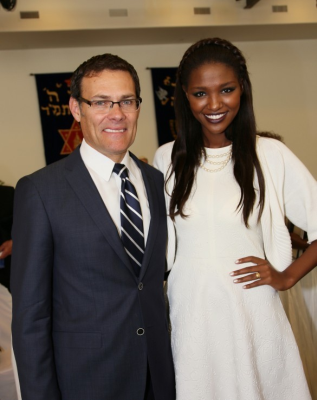Miss Israel, Aka ‘Titi’, Takes A Los Angeles Tour
Feb 6, 2014

Consul General of Israel to Los Angeles David Siegel and Miss Israel, Yityish Aynaw
“Don’t think I am just a beauty queen,” Yityish Aynaw, the 22-year-old Ethiopian-born beauty, declared from the bimah at Ohr HaTorah last Shabbat. With sass and a smile, she crowed, “I was a commander in the Israeli army.”
It comes as no surprise that the woman now known as “Miss Israel” is more than just a docile dish. “People who know me, they don’t see me only as a beauty queen, because they know who I am,” she said during an interview at her hotel.
Aynaw (pronounced ay-NOW) was in Los Angeles as part of a four-city tour with the Rev. Ronald V. Myers, a doctor/preacher/jazz musician who created the National Juneteenth Observance movement, whose aim is to inaugurate an official legal holiday honoring the end of slavery. Myers told me he sees Juneteenth as a day of reconciliation and healing, “the African-American Yom Kippur.”
So imagine how agog he was when he discovered that Miss Israel is black. He invited her to the United States, he said, so he and fellow black Christians could “connect with their Hebrew roots.”
“She’s bringing us all together,” Myers said at the Little Ethiopia Cultural and Resource Center on Fairfax Avenue, one of the Sabbath day tour stops, this one honoring “Titi” — as Aynaw is known in Israel — with a traditional Ethiopian dance performance. “Many African-Americans do not know that there are black Jews, that we have a common history,” he added. When Myers first learned about Aynaw’s story, he was bothered that her plight was so private.
“Why doesn’t anybody know what Israel did to rescue Ethiopian Jews?” he wondered. “It’s like a secret.”
Even after Israel rescued thousands of Ethiopians in the 1980s and ’90s through Operations Moses and Solomon. Those who remained Jews still felt compelled to hide their Jewishness, Aynaw said. Born in Gondar, Ethiopia, to a single mother who died of cancer when Aynaw was 10, she never met her father but said didn’t miss him: “My mom was a strong woman,” she said. “She was like a mom, a dad — everything.” After her mother’s death, Aynaw and her older brother made aliyah to Netanya, where her maternal grandparents were living.
“As a child, I never felt Ethiopia was my home,” she admitted. “People would always call us ‘falasha’ ” — a derogatory term for Jews that means foreigner or exile — “and my mother all the time [would] tell us about Israel. We dreamed about Israel. We always wanted to make aliyah.”
Read the full article here.



